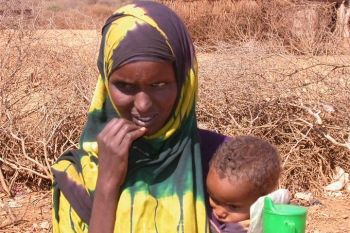
Publisher:
Bonnie King
CONTACT:
Newsroom@Salem-news.com
Advertising:
Adsales@Salem-news.com

~Truth~
~Justice~
~Peace~
TJP
Aug-10-2011 11:26

 TweetFollow @OregonNews
TweetFollow @OregonNews
Somalia's Education Sector Further Threatened by Famine Exodus, UN Warns
Salem-News.comOver $20 million will be needed to help 435,000 children & maintain education.
 Woman and child in Somalia, photo: UN |
(GENEVA) - Immediate action and funding are urgently needed to prevent a dramatic worsening of the educational situation in war- and drought-wracked Somalia, where some 1.8 million children are already out of school, with a knock-on effect on access to health care, the United Nations warned today.
“Education is a critical component of any emergency response,” UN Children’s Fund (UNICEF) Somalia Representative Rozanne Chorlton said on the release of a rapid assessment study carried out last week in 10 regions in southern and central Somalia by an education-themed cluster of 14 agencies and non-governmental organizations (NGOs) led by UNICEF and Save the Children.
“Schools can provide a place for children to come to learn, as well as access health care and other vital services. Providing learning opportunities in safe environments is critical to a child’s survival and development and for the longer term stability and growth of the country.”
Schools are scheduled to open in September and the assessment indicates that the movement of an estimated 200,000 school age children, from urban areas or across the border, could cause the primary school enrolment rate – already only 30 per cent – to drop even more. Scores of thousands of Somalis have been fleeing drought and famine in recent weeks both to Mogadishu, the capital, and to refugee camps in Kenya and Ethiopia.
The study warns that the situation is likely to be compounded by increases in demand for education services in areas where influxes of internally displaced people have been the greatest, such as Mogadishu, and that the population flux may also cause an acute shortage of teachers.
Already, most of 10,000 teachers across the southern and central regions are dependent on incentives paid through the support of education cluster partners, and results indicate that in the Lower Juba, Middle Juba and Bay regions, up to 50 per cent of teachers may not return to the classroom when schools reopen.
Over $20 million will be needed to carry out emergency education plans to help 435,000 children and provide incentives to 5,750 teachers in temporary learning facilities, where food vouchers will also be provided to benefit learners and their families and offer an incentive for children to stay in school, or to enrol for the first time in their lives.
But funding received to date is inadequate, while shortfalls in the education sector have reached their highest levels in the last four years.
“After decades of neglect and lack of funding, the educational opportunities for school-aged children in Somalia are already dire, so it is imperative that we do everything we can to make sure the situation does not get worse,” Ms. Chorlton said.
Source: United Nations
Articles for August 9, 2011 | Articles for August 10, 2011 | Articles for August 11, 2011




googlec507860f6901db00.html
Salem-News.com:
Terms of Service | Privacy Policy
All comments and messages are approved by people and self promotional links or unacceptable comments are denied.
Muthamizh August 10, 2011 7:56 pm (Pacific time)
Atleast United Nation must act and allot fund to do the needful of Somalians
[Return to Top]©2026 Salem-News.com. All opinions expressed in this article are those of the author and do not necessarily reflect those of Salem-News.com.